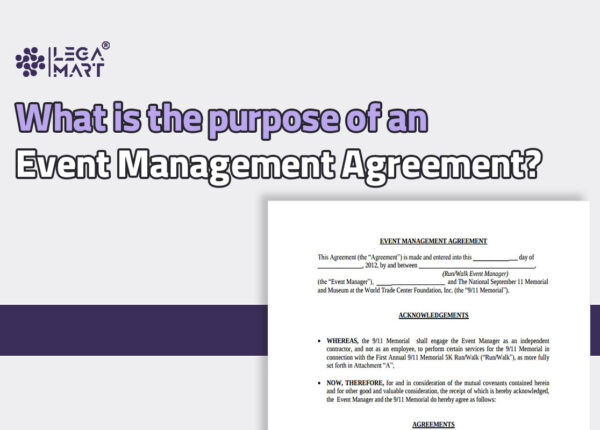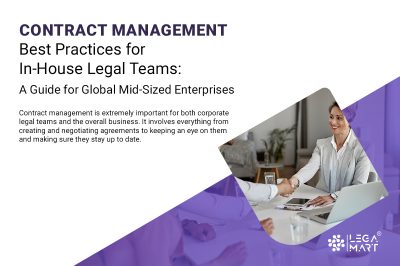Introduction
Planning an event can be both exciting and overwhelming, as it involves many intricate details. Whether planning a wedding, a concert, or a corporate event, event management is the backbone that will hold everything together, ensuring that the event proceeds without a hitch. It encompasses various tasks, from planning and coordination to execution and post-event evaluations. Among all these responsibilities, the event management agreement brings together a team of dedicated event experts who will handle every aspect of your event, from the initial idea to its execution.
For an event to be truly successful and seamless, it requires meticulous management. Many tasks and responsibilities go into making it a reality. Fortunately, there are skilled individuals capable of managing various types of events. Effective event management involves collaboration and agreement among multiple parties on how the event should be planned and executed. It’s a challenging but rewarding endeavor that requires a shared vision and cooperation to make the event an outstanding experience for all involved.
What is the purpose of an event management agreement?

An event management agreement is a legally binding document establishing a contract between two or more parties involved in event management i,e an event manager or the company/individual. Event management agreement sets out the terms and conditions that govern the responsibilities, obligations, and rights of both parties involved in the event planning and execution process, and it serves the following purposes;
- It is a formal agreement between event planners or coordinators and their clients, ensuring a seamless and well-organized event.
- It clarifies the scope of services in detail to ensure the client understands the services they can expect from you as the event planner.
- The agreement is tailored to accommodate the specific requests and preferences of the clients, allowing them to articulate their expectations clearly.
- It provides a platform for the event planners to outline their approach and strategies for executing the event, considering the client’s desires.
- It ensures that both parties thoroughly discuss and mutually agree upon the terms and conditions for engaging the event planners or coordinators.
- This comprehensive understanding helps clarify the responsibilities of the event coordinators and ensures that the clients know what to expect throughout the event planning process.
- It aims to facilitate a successful event management, leading to a memorable and well-executed event for all involved.
Who holds the rights to event-related materials and outcomes?
The ownership of event-related materials and outcomes typically depends on the terms specified in the event management agreement or contract between the event planner and the client. These terms can vary. Therefore, it is fundamental that parties clearly outline them in the agreement to avoid any disagreements later on.
On the one hand, the event management company owns the materials they create specifically for the event, like event plans, designs, layouts, and other creative elements. On the other hand, the client usually owns any materials they provide to the company for use in the event.
Regarding event outcomes, such as photographs, videos, or recordings taken during the event, the ownership rights are often discussed and defined in the contract. It’s common for the client to have the right to use event outcomes for their purposes, such as marketing or promotional materials. At the same time, the event planner may also have the right to use event outcomes for their portfolio or promotional purposes, but they will give proper credit to the client.
Generally, both parties must discuss and agree on these ownership rights before the event occurs to clearly understand each party’s rights and responsibilities concerning event-related materials and outcomes.
Essential clauses to be included in the contract

While drafting an event management agreement, the following are some critical clauses that must be included:
Defining the Event Planning Services
There must be a clear explanation of the expectations involved and the kind of services provided during the event management agreement. This section must be as detailed as possible, considering that ambiguous language may lead to misunderstandings in the future. Some standard services that may be included are catering, marketing, on-site event staff, and visual/audio equipment, among others. This must be substantiated with precise details about the vendors working alongside and their respective service details. Ensure that there is a clear list of tasks to be fulfilled, and ensure that you do not do tasks outside the established ambit.
Identification of the parties involved
The parties involved must be clearly outlined in the event management agreement, especially the parties with whom the agreement is being executed. This includes the person providing the event management services and the person for whom the services are being provided. While their details are mentioned at the beginning of the event management agreement, ensure that the details of other parties working alongside the event management service provider have also been provided. This can either be under the description of the services provided or be included as a separate clause/annexure altogether.
Payment Schedule
The general trend within the event management services is that the event planning work includes an initial deposit stage, followed by the deposit of the remaining amount. This means that the service receiver is expected to provide some advance amount to the service provider as part of the event planning timeline established. This may be followed by smaller payments made while reaching various milestones in the planning phase or completing the remaining payment when the event ends. Ensure a clear description of how the payment details are calculated by subdividing the payments for the different services provided and adding taxes and other added fees. This shall form an entirely agreed-upon pricing structure.
Some important aspects to note is that any changes made during the course of the event management agreement must be followed by drafting an amendment to the agreement, which must be signed by the client as well. This amendment shall outline the changes in pricing, the reason for such changes, and the date when the changes were made. Further, make a separate folder for all the financial documents, such as receipts.
Term of Cancellation of Events
This forms an integral part of the agreement, considering that it protects the interest of both parties involved if things do not go as planned and if the event is subjected to cancellation. Including this clause ensures that the parties are protected from any monetary losses. It must be clearly mentioned that payments made before cancellation are non-refundable, followed by how clients shall be held responsible for any costs incurred after the last payment.
Therefore, if the last payment has been the initial deposit between the parties and it is soon followed by cancellation of the agreement, the costs incurred by the vendor between the initial deposit and the cancellation shall be adequately compensated by the client. Further, provide precise details about what constitutes a valid cancellation and at what stage the event can be successfully cancelled. Beyond that stage/milestone, the client shall be charged with the complete event amount, irrespective of whether the event occurs.
Clause on Termination
This is different from cancellation since there are different reasons for termination and cancellation of an agreement. Usually, the agreement is terminated due to unforeseeable events beyond the control of the parties involved. This is due to some force majeure events that must already be envisaged in the agreement, such as events of weather-related incidents, government shutdowns, pandemics, etc. A termination clause means that neither party can be held liable.
Alternatively, termination clauses may also be invoked if disagreements arise during the agreement. This can be due to the negligent or reckless behaviour of the parties, wherein either the parties mutually decide not to go forward with the agreement or any of the parties communicate their intention of termination to the other party by providing a notice in writing, followed by a review period to see if the disagreements can be resolved. If the same does not work, the agreement may be terminated.
Clause on Indemnification
In a whole range of things that may go wrong during the term of the agreement, a third party may be sued for any negligence on the client’s part. This may be in the form of destructive, inebriated guests or the ignorance of safety regulations by them or your client. For example, if any party is injured due to their negligence, the indemnification clause ensures that you are not held liable. It is preferable to have a mutual indemnification clause with all the vendors, wherein they have a common understanding of not being responsible for certain losses/damages incurred due to negligence. This further ensures that the parties are in a position to claim insurance from their respective insurance companies for any mishap that takes place.
Sample event management template
EVENT MANAGEMENT AGREEMENT
PARTIES
This event planning contract (hereinafter referred to as the “Contract”) is entered into on ________________ (the “Effective Date”), by and between ________________________, with an address of ________________ (hereinafter referred to as the “Client”) and ________________, with an address of ________________, (hereinafter referred to as the “Planner”) (collectively referred to as the “Parties”).
EVENT BACKGROUND
The event will take place on ________________, on which date(s) the Client plans to hold the event described below:
____________________________________________________________________________________________________________________________________________________________________________________________________________________________________________________________________________________________________________
PLANNER DUTIES
The Client hereby engages the Planner to perform the following duties relevant to the event:
________________________________________________________________________________________________________________________________________________________________________________________________________________________________________________________________________________________________________________________
The Planner is required to obtain written consent from the Client prior to entering into any contractual agreements or issuing deposits or invoices.
PAYMENTS
- The Client hereby agrees to pay the Planner an amount of ________________ for the services performed.
- The Planner will provide an invoice at the time of the payment.
CANCELLATION POLICY
- The Client is entitled to cancel this Contract at any given time.
- The Client is entitled to a full refund in the event that he/she cancels ________________ days before the beginning of the event.
- In the event that the Client cancels less than ________________ days before the beginning of the event, he/she will not be entitled to a refund.
- The Planner is entitled to cancel this Contract at any given time.
- In the event of cancellation by the Planner, he/she is required to provide a replacement planner that the Client agrees to. In this case, the Planner will be required to refund any money previously provided by the Client as a budget for the event or other.
DISPUTE RESOLUTION ALTERNATIVES
Any dispute or difference whatsoever arising out of, or in connection with, this Contract shall be submitted to arbitration/mediation/negotiation (circle one) in accordance with and subject to the laws of ________________.
LEGAL FEES
In the event of a dispute that results in legal action, the successful party will be entitled to the legal fees, such as attorney’s fees or others.
SEVERABILITY
In the event that any provision of this Contract is found to be void and unenforceable by a court of competent jurisdiction, then the remaining provisions will remain in force in accordance with the Parties’ intention.
ENTIRE AGREEMENT
This Contract contains the entire agreement and understanding among the Parties to it with respect to its subject matter. It supersedes all prior agreements, understandings, inducements and conditions, express or implied, oral or written, of any nature whatsoever with respect to its subject matter. The express terms of the Contract control and supersede any course of performance and/or usage of the trade inconsistent with any of its terms.
GOVERNING LAW
This Contract shall be governed by and construed in accordance with the laws of ________________.
SIGNATURE AND DATE
– The Parties hereby agree to the terms and conditions set forth in this Contract, and such is demonstrated by their signatures below:
CLIENT
Name:____________________________
Signature:_________________________
Date:_____________________________
PLANNER
Name:____________________________
Signature:_________________________
Date:_____________________________
Conclusion
When it comes to event management services, the proper execution of an event management agreement acts as your safety net, within the terms of which you can defend yourself from unwelcome surprises. You should avoid undertaking any work on a verbal-only agreement and ensure that every detail is clearly included within the event management agreement clauses. This shall ensure that you are financially protected and prevent any unnecessary disputes that may lead to eroded business relationships.
Once your event management agreement has been properly drafted, ensure you have reviewed the contents yourself. Before signing the agreement, Spend some time editing or adding more clauses depending on your business needs.
Signing an event management agreement?
Considering the service-centric nature of an event management agreement, ensure that you have minimized the risks of potential disputes as much as possible. This shall require the mutual negotiation of the parties, along with the involvement of a professional with experience in handling such agreements. Besides, in today’s digital age, event management agreements have evolved to accommodate electronic signatures, making the process more efficient and convenient for all parties involved. With the use of electronic signatures, clients, event organizers, and vendors can easily review and sign contracts from the comfort of their own devices, reducing the need for physical paperwork and expediting the agreement process.
You may take the assistance of our experienced team of lawyers at LegaMart, who not only have the required experience in event management agreement but shall also assist you during the complete cycle, starting from the stage of hiring an event planner to when the parties decide to sign an event management agreement and start the execution of the terms envisaged. Refer to our services today!





